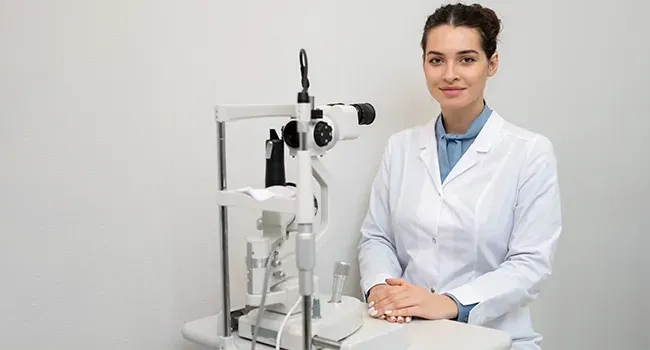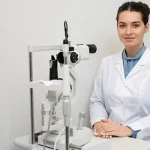Your eyes are one of your most valuable assets, and maintaining their health should be a top priority. Regular visits to an ophthalmologist can ensure optimal eye care and help detect vision problems early. But who is an ophthalmologist, and how do you choose the best ophthalmologist for your needs?
In this blog, we will discuss the role of an ophthalmologist, essential tips for finding the right specialist, and when to seek their expertise. Additionally, we’ll answer frequently asked questions and guide you toward making an informed decision for your eye health.
Also Read: What is Pediatric Ophthalmology?
The Importance of Eye Care
Good eye health is essential for maintaining overall well-being. Vision-related issues can develop gradually, often going unnoticed until they impact your quality of life. Regular eye exams can help detect conditions like refractive errors, cataracts, or glaucoma early, preventing long-term vision loss.
To ensure that you get the best care, choosing a qualified and experienced ophthalmologist is key. Understanding the qualifications of an ophthalmologist and what sets them apart will help you find the right specialist for your specific needs.
Who is an Ophthalmologist?
An ophthalmologist is a medical doctor who specialises in diagnosing, treating, and managing eye conditions. They undergo extensive education and clinical training to acquire expertise in eye care.
Here’s what makes an ophthalmologist different:
- Medical Degree: Ophthalmologists are licensed medical professionals (MBBS + specialisation) with years of training.
- Specialisation: They specialise in ophthalmology, a branch of medicine dedicated to eye health.
- Surgical Expertise: Ophthalmologists can perform surgeries for cataracts, glaucoma, corneal disorders, and more.
If you are dealing with advanced eye conditions, consulting the best ophthalmologist ensures you receive the highest quality care and treatment.
How to Choose the Best Ophthalmologist?
Choosing an ophthalmologist involves careful consideration of their qualifications, experience, and patient care approach. Finding the right eye doctor can seem daunting. Below are the key steps to help you make an informed decision.
Tips for Finding the Right Ophthalmologist
Experience and Expertise
Look for details such as:
- Years of practice in the field of ophthalmology.
- Areas of specialisation (e.g., cataract surgery, glaucoma management, retina disorders).
- Track record of successful treatments and surgeries.
Proper Qualifications
Qualifications of an eye doctor are crucial in determining their competence. Ensure the ophthalmologist has completed:
- An MBBS degree from a recognised medical institution.
- A specialisation in ophthalmology, such as MS, MD, DO, or DNB.
- Additional fellowships or training in sub-specialties like cornea, retina, or pediatric ophthalmology.
Referrals and Recommendations
Ask for referrals from trusted sources such as family, friends, or your primary care physician. Recommendations from people who have undergone similar treatments can provide valuable insights into the doctor’s expertise and approach.
Patient Testimonials and Reviews
Check patient reviews to evaluate the ophthalmologist’s reputation and care quality. Look for:
- Feedback on their treatment success.
- Patient experiences with staff, appointments, and post-treatment care.
- Ratings on platforms like Google.
Positive reviews indicate the reliability of the ophthalmologist and can help you feel confident in your choice.
Research the Clinic or Hospital
The reputation and infrastructure of the clinic or hospital are equally important. Consider factors like:
- Availability of advanced technology and equipment.
- Clean and professional facilities.
- Range of treatments and services offered.
Reputed clinics often house specialists with experienced eye doctors and provide comprehensive care.
When to Visit an Ophthalmologist?
It’s important to recognise symptoms that indicate the need for an immediate visit to an ophthalmologist. Look for the following signs:
- Blurry or double-vision
- Persistent eye pain or redness
- Sudden loss of vision
- Frequent headaches or eye strain
- Difficulty seeing at night or in bright light
- Flashes of light or floaters in vision
If you experience any of these symptoms, consult an ophthalmologist promptly to prevent further complications. Regular eye exams, timely intervention, and specialised care from an experienced ophthalmologist can address eye conditions effectively and improve your quality of life.
Have you been delaying an eye exam for quite some time? Book an Appointment with Centre for Sight in India!
Frequently Asked Questions
Yes, an ophthalmologist is a qualified MBBS doctor who undergoes additional specialisation in ophthalmology, allowing them to diagnose and treat various eye conditions, including surgical procedures.
If you have complex eye issues requiring surgical intervention, an ophthalmologist is the best specialist to consult. Optometrists are trained paramedical persons who handle routine eye exams, while ophthalmologists are doctors/surgeons who provide advanced care.
You should consult an ophthalmologist if you experience blurry vision, eye pain, frequent headaches, or any other red flags, such as sudden vision loss or flashes of light. Regular eye checkups are also essential for maintaining eye health.
The highest qualification for an ophthalmologist includes an MBBS degree followed by a postgraduate specialisation like MS (Master of Surgery), DO (Diploma in Ophthalmology), or DNB (Diplomate of National Board). Some may also pursue fellowships in sub-specialties.





